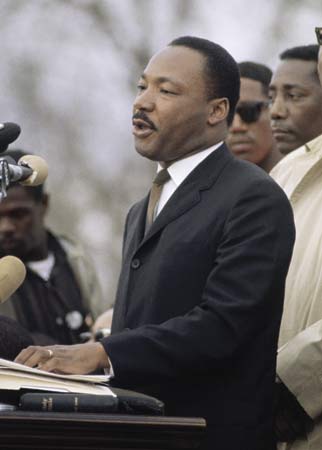|
We are told that those who differ from us on a few things are different from us on all things; that our problems are the fault of those who don’t think like us or look like us or come from where we do. The welfare queen is taking our tax money. The immigrant is taking our jobs. The believer condemns the non-believer as immoral, and the non-believer chides the believer as intolerant.
For most of this country’s history, we in the African-American community have been at the receiving end of man’s inhumanity to man. And all of us understand intimately the insidious role that race still sometimes plays – on the job, in the schools, in our health care system, and in our criminal justice system.
And yet, if we are honest with ourselves, we must admit that none of our hands are entirely clean. If we’re honest with ourselves, we’ll acknowledge that our own community has not always been true to King’s vision of a beloved community.
We have scorned our gay brothers and sisters instead of embracing them. The scourge of anti-Semitism has, at times, revealed itself in our community. For too long, some of us have seen immigrants as competitors for jobs instead of companions in the fight for opportunity.
Every day, our politics fuels and exploits this kind of division across all races and regions; across gender and party. It is played out on television. It is sensationalized by the media. And last week, it even crept into the campaign for President, with charges and counter-charges that served to obscure the issues instead of illuminating the critical choices we face as a nation.
So let us say that on this day of all days, each of us carries with us the task of changing our hearts and minds. The division, the stereotypes, the scape-goating, the ease with which we blame our plight on others – all of this distracts us from the common challenges we face – war and poverty; injustice and inequality. We can no longer afford to build ourselves up by tearing someone else down. We can no longer afford to traffic in lies or fear or hate. It is the poison that we must purge from our politics; the wall that we must tear down before the hour grows too late.
Because if Dr. King could love his jailor; if he could call on the faithful who once sat where you do to forgive those who set dogs and fire hoses upon them, then surely we can look past what divides us in our time, and bind up our wounds, and erase the empathy deficit that exists in our hearts…
The Scripture tells us that we are judged not just by word, but by deed. And if we are to truly bring about the unity that is so crucial in this time, we must find it within ourselves to act on what we know; to understand that living up to this country’s ideals and its possibilities will require great effort and resources; sacrifice and stamina.
And that is what is at stake in the great political debate we are having today. The changes that are needed are not just a matter of tinkering at the edges, and they will not come if politicians simply tell us what we want to hear. All of us will be called upon to make some sacrifice. None of us will be exempt from responsibility. We will have to fight to fix our schools, but we will also have to challenge ourselves to be better parents. We will have to confront the biases in our criminal justice system, but we will also have to acknowledge the deep-seated violence that still resides in our own communities and marshal the will to break its grip.
That is how we will bring about the change we seek. That is how Dr. King led this country through the wilderness. He did it with words – words that he spoke not just to the children of slaves, but the children of slave owners. Words that inspired not just black but also white; not just the Christian but the Jew; not just the Southerner but also the Northerner.
He led with words, but he also led with deeds. He also led by example. He led by marching and going to jail and suffering threats and being away from his family. He led by taking a stand against a war, knowing full well that it would diminish his popularity. He led by challenging our economic structures, understanding that it would cause discomfort. Dr. King understood that unity cannot be won on the cheap; that we would have to earn it through great effort and determination.
That is the unity – the hard-earned unity – that we need right now. It is that effort, and that determination, that can transform blind optimism into hope – the hope to imagine, and work for, and fight for what seemed impossible before.
|

